
Als Sohn des Leibarztes von Cosimo de’ Medici erhielt Marsilio Ficino schon in jungen Jahren den Auftrag, Griechisch zu lernen und die Schriften Platons zu übersetzen. Auf Anregung seines Freundes Pico della Mirandola fertigte er im Anschluss daran auch eine lateinische Version vom Werk des Neuplatonikers Plotin an. Er ordnete die plotinischen Traktate in sechs Neunergruppen (Enneaden) und schrieb zu jedem der 54 ‚Bücher‘ eine kommentierende Einleitung. Mit einer Widmung an Lorenzo de’ Medici wurde Ficinos Plotinausgabe am 7. Mai 1492 in Florenz gedruckt. Seit diesem Erstdruck hat es einige weitere Editionen gegeben, zuletzt 1835 durch Friedrich Creuzer.
In der nunmehr auf drei Bände verteilten modernen Ausgabe der von Ficino selbst als Kommentar bezeichneten Einleitungen ist erstmals eine textkritische Edition mit einer deutschen Übersetzung versehen.****************The son of Cosimo de’ Medici’s personal physician, Marsilio Ficino was commissioned at a young age to learn Greek and to translate Plato’s writings. At the suggestion of his friend Pico della Mirandola, he subsequently produced a Latin version of the work of the neo-Platonist Plotinus. He arranged Plotinus’ treatises into six nine-groups (Enneaden) and wrote a commenting introduction to each of those 54 ‘books’. With a dedication to Lorenzo de’ Medici, Ficino’s Plotinus edition was printed in Florence on 7 May 1492. Since this first edition there have been published several others, most recently in 1835 by Friedrich Creuzer.
In this modern edition of the introductions, which Ficino himself described as a commentary, distributed over three volumes, a text-critical edition with a German translation is provided for the first time.
Aktualisiert: 2023-06-30
> findR *
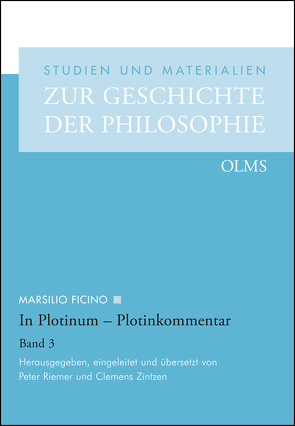
Als Sohn des Leibarztes von Cosimo de’ Medici erhielt Marsilio Ficino schon in jungen Jahren den Auftrag, Griechisch zu lernen und die Schriften Platons zu übersetzen. Auf Anregung seines Freundes Pico della Mirandola fertigte er im Anschluss daran auch eine lateinische Version vom Werk des Neuplatonikers Plotin an. Er ordnete die plotinischen Traktate in sechs Neunergruppen (Enneaden) und schrieb zu jedem der 54 ‚Bücher‘ eine kommentierende Einleitung. Mit einer Widmung an Lorenzo de’ Medici wurde Ficinos Plotinausgabe am 7. Mai 1492 in Florenz gedruckt. Seit diesem Erstdruck hat es einige weitere Editionen gegeben, zuletzt 1835 durch Friedrich Creuzer.
In der nunmehr auf drei Bände verteilten modernen Ausgabe der von Ficino selbst als Kommentar bezeichneten Einleitungen ist erstmals eine textkritische Edition mit einer deutschen Übersetzung versehen.****************The son of Cosimo de’ Medici’s personal physician, Marsilio Ficino was commissioned at a young age to learn Greek and to translate Plato’s writings. At the suggestion of his friend Pico della Mirandola, he subsequently produced a Latin version of the work of the neo-Platonist Plotinus. He arranged Plotinus’ treatises into six nine-groups (Enneaden) and wrote a commenting introduction to each of those 54 ‘books’. With a dedication to Lorenzo de’ Medici, Ficino’s Plotinus edition was printed in Florence on 7 May 1492. Since this first edition there have been published several others, most recently in 1835 by Friedrich Creuzer.
In this modern edition of the introductions, which Ficino himself described as a commentary, distributed over three volumes, a text-critical edition with a German translation is provided for the first time.
Aktualisiert: 2023-06-30
> findR *
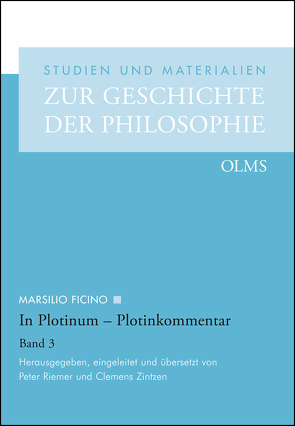
Als Sohn des Leibarztes von Cosimo de’ Medici erhielt Marsilio Ficino schon in jungen Jahren den Auftrag, Griechisch zu lernen und die Schriften Platons zu übersetzen. Auf Anregung seines Freundes Pico della Mirandola fertigte er im Anschluss daran auch eine lateinische Version vom Werk des Neuplatonikers Plotin an. Er ordnete die plotinischen Traktate in sechs Neunergruppen (Enneaden) und schrieb zu jedem der 54 ‚Bücher‘ eine kommentierende Einleitung. Mit einer Widmung an Lorenzo de’ Medici wurde Ficinos Plotinausgabe am 7. Mai 1492 in Florenz gedruckt. Seit diesem Erstdruck hat es einige weitere Editionen gegeben, zuletzt 1835 durch Friedrich Creuzer.
In der nunmehr auf drei Bände verteilten modernen Ausgabe der von Ficino selbst als Kommentar bezeichneten Einleitungen ist erstmals eine textkritische Edition mit einer deutschen Übersetzung versehen.****************The son of Cosimo de’ Medici’s personal physician, Marsilio Ficino was commissioned at a young age to learn Greek and to translate Plato’s writings. At the suggestion of his friend Pico della Mirandola, he subsequently produced a Latin version of the work of the neo-Platonist Plotinus. He arranged Plotinus’ treatises into six nine-groups (Enneaden) and wrote a commenting introduction to each of those 54 ‘books’. With a dedication to Lorenzo de’ Medici, Ficino’s Plotinus edition was printed in Florence on 7 May 1492. Since this first edition there have been published several others, most recently in 1835 by Friedrich Creuzer.
In this modern edition of the introductions, which Ficino himself described as a commentary, distributed over three volumes, a text-critical edition with a German translation is provided for the first time.
Aktualisiert: 2023-06-30
> findR *

Als Sohn des Leibarztes von Cosimo de’ Medici erhielt Marsilio Ficino schon in jungen Jahren den Auftrag, Griechisch zu lernen und die Schriften Platons zu übersetzen. Auf Anregung seines Freundes Pico della Mirandola fertigte er im Anschluss daran auch eine lateinische Version vom Werk des Neuplatonikers Plotin an. Er ordnete die plotinischen Traktate in sechs Neunergruppen (Enneaden) und schrieb zu jedem der 54 ‚Bücher‘ eine kommentierende Einleitung. Mit einer Widmung an Lorenzo de’ Medici wurde Ficinos Plotinausgabe am 7. Mai 1492 in Florenz gedruckt. Seit diesem Erstdruck hat es einige weitere Editionen gegeben, zuletzt 1835 durch Friedrich Creuzer.
In der nunmehr auf drei Bände verteilten modernen Ausgabe der von Ficino selbst als Kommentar bezeichneten Einleitungen ist erstmals eine textkritische Edition mit einer deutschen Übersetzung versehen.****************The son of Cosimo de’ Medici’s personal physician, Marsilio Ficino was commissioned at a young age to learn Greek and to translate Plato’s writings. At the suggestion of his friend Pico della Mirandola, he subsequently produced a Latin version of the work of the neo-Platonist Plotinus. He arranged Plotinus’ treatises into six nine-groups (Enneaden) and wrote a commenting introduction to each of those 54 ‘books’. With a dedication to Lorenzo de’ Medici, Ficino’s Plotinus edition was printed in Florence on 7 May 1492. Since this first edition there have been published several others, most recently in 1835 by Friedrich Creuzer.
In this modern edition of the introductions, which Ficino himself described as a commentary, distributed over three volumes, a text-critical edition with a German translation is provided for the first time.
Aktualisiert: 2023-06-30
> findR *
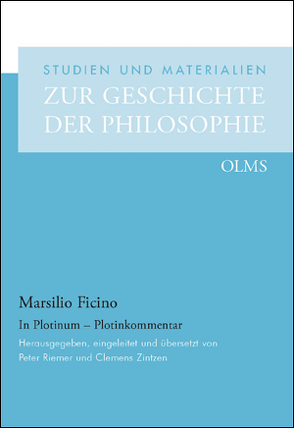
Als Sohn des Leibarztes von Cosimo de’ Medici erhielt Marsilio Ficino schon in jungen Jahren den Auftrag, Griechisch zu lernen und die Schriften Platons zu übersetzen. Auf Anregung seines Freundes Pico della Mirandola fertigte er im Anschluss daran auch eine lateinische Version vom Werk des Neuplatonikers Plotin an. Er ordnete die plotinischen Traktate in sechs Neunergruppen (Enneaden) und schrieb zu jedem der 54 ‚Bücher‘ eine kommentierende Einleitung. Mit einer Widmung an Lorenzo de’ Medici wurde Ficinos Plotinausgabe am 7. Mai 1492 in Florenz gedruckt. Seit diesem Erstdruck hat es einige weitere Editionen gegeben, zuletzt 1835 durch Friedrich Creuzer.
In der nunmehr auf drei Bände verteilten modernen Ausgabe der von Ficino selbst als Kommentar bezeichneten Einleitungen ist erstmals eine textkritische Edition mit einer deutschen Übersetzung versehen.****************The son of Cosimo de’ Medici’s personal physician, Marsilio Ficino was commissioned at a young age to learn Greek and to translate Plato’s writings. At the suggestion of his friend Pico della Mirandola, he subsequently produced a Latin version of the work of the neo-Platonist Plotinus. He arranged Plotinus’ treatises into six nine-groups (Enneaden) and wrote a commenting introduction to each of those 54 ‘books’. With a dedication to Lorenzo de’ Medici, Ficino’s Plotinus edition was printed in Florence on 7 May 1492. Since this first edition there have been published several others, most recently in 1835 by Friedrich Creuzer.
In this modern edition of the introductions, which Ficino himself described as a commentary, distributed over three volumes, a text-critical edition with a German translation is provided for the first time.
Aktualisiert: 2023-06-30
> findR *
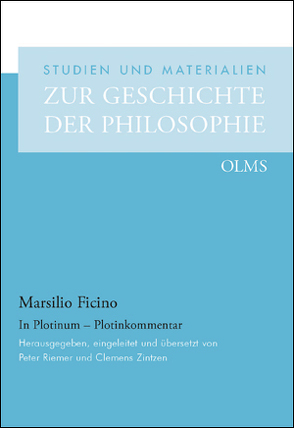
Als Sohn des Leibarztes von Cosimo de’ Medici erhielt Marsilio Ficino schon in jungen Jahren den Auftrag, Griechisch zu lernen und die Schriften Platons zu übersetzen. Auf Anregung seines Freundes Pico della Mirandola fertigte er im Anschluss daran auch eine lateinische Version vom Werk des Neuplatonikers Plotin an. Er ordnete die plotinischen Traktate in sechs Neunergruppen (Enneaden) und schrieb zu jedem der 54 ‚Bücher‘ eine kommentierende Einleitung. Mit einer Widmung an Lorenzo de’ Medici wurde Ficinos Plotinausgabe am 7. Mai 1492 in Florenz gedruckt. Seit diesem Erstdruck hat es einige weitere Editionen gegeben, zuletzt 1835 durch Friedrich Creuzer.
In der nunmehr auf drei Bände verteilten modernen Ausgabe der von Ficino selbst als Kommentar bezeichneten Einleitungen ist erstmals eine textkritische Edition mit einer deutschen Übersetzung versehen.****************The son of Cosimo de’ Medici’s personal physician, Marsilio Ficino was commissioned at a young age to learn Greek and to translate Plato’s writings. At the suggestion of his friend Pico della Mirandola, he subsequently produced a Latin version of the work of the neo-Platonist Plotinus. He arranged Plotinus’ treatises into six nine-groups (Enneaden) and wrote a commenting introduction to each of those 54 ‘books’. With a dedication to Lorenzo de’ Medici, Ficino’s Plotinus edition was printed in Florence on 7 May 1492. Since this first edition there have been published several others, most recently in 1835 by Friedrich Creuzer.
In this modern edition of the introductions, which Ficino himself described as a commentary, distributed over three volumes, a text-critical edition with a German translation is provided for the first time.
Aktualisiert: 2023-06-30
> findR *
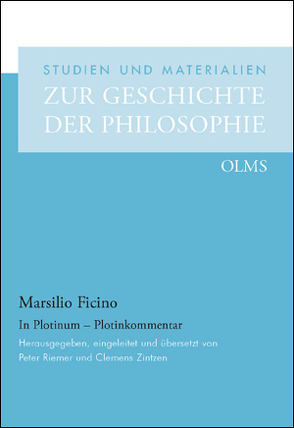
Als Sohn des Leibarztes von Cosimo de’ Medici erhielt Marsilio Ficino schon in jungen Jahren den Auftrag, Griechisch zu lernen und die Schriften Platons zu übersetzen. Auf Anregung seines Freundes Pico della Mirandola fertigte er im Anschluss daran auch eine lateinische Version vom Werk des Neuplatonikers Plotin an. Er ordnete die plotinischen Traktate in sechs Neunergruppen (Enneaden) und schrieb zu jedem der 54 ‚Bücher‘ eine kommentierende Einleitung. Mit einer Widmung an Lorenzo de’ Medici wurde Ficinos Plotinausgabe am 7. Mai 1492 in Florenz gedruckt. Seit diesem Erstdruck hat es einige weitere Editionen gegeben, zuletzt 1835 durch Friedrich Creuzer.
In der nunmehr auf drei Bände verteilten modernen Ausgabe der von Ficino selbst als Kommentar bezeichneten Einleitungen ist erstmals eine textkritische Edition mit einer deutschen Übersetzung versehen.****************The son of Cosimo de’ Medici’s personal physician, Marsilio Ficino was commissioned at a young age to learn Greek and to translate Plato’s writings. At the suggestion of his friend Pico della Mirandola, he subsequently produced a Latin version of the work of the neo-Platonist Plotinus. He arranged Plotinus’ treatises into six nine-groups (Enneaden) and wrote a commenting introduction to each of those 54 ‘books’. With a dedication to Lorenzo de’ Medici, Ficino’s Plotinus edition was printed in Florence on 7 May 1492. Since this first edition there have been published several others, most recently in 1835 by Friedrich Creuzer.
In this modern edition of the introductions, which Ficino himself described as a commentary, distributed over three volumes, a text-critical edition with a German translation is provided for the first time.
Aktualisiert: 2023-06-30
> findR *
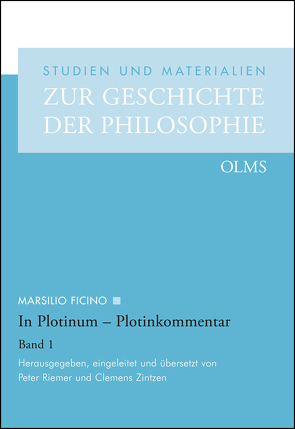
Als Sohn des Leibarztes von Cosimo de’ Medici erhielt Marsilio Ficino schon in jungen Jahren den Auftrag, Griechisch zu lernen und die Schriften Platons zu übersetzen. Auf Anregung seines Freundes Pico della Mirandola fertigte er im Anschluss daran auch eine lateinische Version vom Werk des Neuplatonikers Plotin an. Er ordnete die plotinischen Traktate in sechs Neunergruppen (Enneaden) und schrieb zu jedem der 54 ‚Bücher‘ eine kommentierende Einleitung. Mit einer Widmung an Lorenzo de’ Medici wurde Ficinos Plotinausgabe am 7. Mai 1492 in Florenz gedruckt. Seit diesem Erstdruck hat es einige weitere Editionen gegeben, zuletzt 1835 durch Friedrich Creuzer.
In der nunmehr auf drei Bände verteilten modernen Ausgabe der von Ficino selbst als Kommentar bezeichneten Einleitungen ist erstmals eine textkritische Edition mit einer deutschen Übersetzung versehen.****************The son of Cosimo de’ Medici’s personal physician, Marsilio Ficino was commissioned at a young age to learn Greek and to translate Plato’s writings. At the suggestion of his friend Pico della Mirandola, he subsequently produced a Latin version of the work of the neo-Platonist Plotinus. He arranged Plotinus’ treatises into six nine-groups (Enneaden) and wrote a commenting introduction to each of those 54 ‘books’. With a dedication to Lorenzo de’ Medici, Ficino’s Plotinus edition was printed in Florence on 7 May 1492. Since this first edition there have been published several others, most recently in 1835 by Friedrich Creuzer.
In this modern edition of the introductions, which Ficino himself described as a commentary, distributed over three volumes, a text-critical edition with a German translation is provided for the first time.
Aktualisiert: 2023-06-30
> findR *
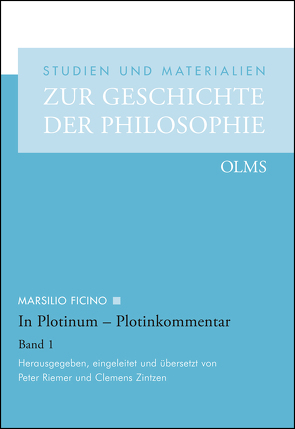
Als Sohn des Leibarztes von Cosimo de’ Medici erhielt Marsilio Ficino schon in jungen Jahren den Auftrag, Griechisch zu lernen und die Schriften Platons zu übersetzen. Auf Anregung seines Freundes Pico della Mirandola fertigte er im Anschluss daran auch eine lateinische Version vom Werk des Neuplatonikers Plotin an. Er ordnete die plotinischen Traktate in sechs Neunergruppen (Enneaden) und schrieb zu jedem der 54 ‚Bücher‘ eine kommentierende Einleitung. Mit einer Widmung an Lorenzo de’ Medici wurde Ficinos Plotinausgabe am 7. Mai 1492 in Florenz gedruckt. Seit diesem Erstdruck hat es einige weitere Editionen gegeben, zuletzt 1835 durch Friedrich Creuzer.
In der nunmehr auf drei Bände verteilten modernen Ausgabe der von Ficino selbst als Kommentar bezeichneten Einleitungen ist erstmals eine textkritische Edition mit einer deutschen Übersetzung versehen.****************The son of Cosimo de’ Medici’s personal physician, Marsilio Ficino was commissioned at a young age to learn Greek and to translate Plato’s writings. At the suggestion of his friend Pico della Mirandola, he subsequently produced a Latin version of the work of the neo-Platonist Plotinus. He arranged Plotinus’ treatises into six nine-groups (Enneaden) and wrote a commenting introduction to each of those 54 ‘books’. With a dedication to Lorenzo de’ Medici, Ficino’s Plotinus edition was printed in Florence on 7 May 1492. Since this first edition there have been published several others, most recently in 1835 by Friedrich Creuzer.
In this modern edition of the introductions, which Ficino himself described as a commentary, distributed over three volumes, a text-critical edition with a German translation is provided for the first time.
Aktualisiert: 2023-06-30
> findR *
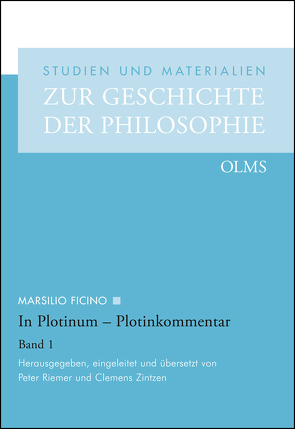
Als Sohn des Leibarztes von Cosimo de’ Medici erhielt Marsilio Ficino schon in jungen Jahren den Auftrag, Griechisch zu lernen und die Schriften Platons zu übersetzen. Auf Anregung seines Freundes Pico della Mirandola fertigte er im Anschluss daran auch eine lateinische Version vom Werk des Neuplatonikers Plotin an. Er ordnete die plotinischen Traktate in sechs Neunergruppen (Enneaden) und schrieb zu jedem der 54 ‚Bücher‘ eine kommentierende Einleitung. Mit einer Widmung an Lorenzo de’ Medici wurde Ficinos Plotinausgabe am 7. Mai 1492 in Florenz gedruckt. Seit diesem Erstdruck hat es einige weitere Editionen gegeben, zuletzt 1835 durch Friedrich Creuzer.
In der nunmehr auf drei Bände verteilten modernen Ausgabe der von Ficino selbst als Kommentar bezeichneten Einleitungen ist erstmals eine textkritische Edition mit einer deutschen Übersetzung versehen.****************The son of Cosimo de’ Medici’s personal physician, Marsilio Ficino was commissioned at a young age to learn Greek and to translate Plato’s writings. At the suggestion of his friend Pico della Mirandola, he subsequently produced a Latin version of the work of the neo-Platonist Plotinus. He arranged Plotinus’ treatises into six nine-groups (Enneaden) and wrote a commenting introduction to each of those 54 ‘books’. With a dedication to Lorenzo de’ Medici, Ficino’s Plotinus edition was printed in Florence on 7 May 1492. Since this first edition there have been published several others, most recently in 1835 by Friedrich Creuzer.
In this modern edition of the introductions, which Ficino himself described as a commentary, distributed over three volumes, a text-critical edition with a German translation is provided for the first time.
Aktualisiert: 2023-06-30
> findR *
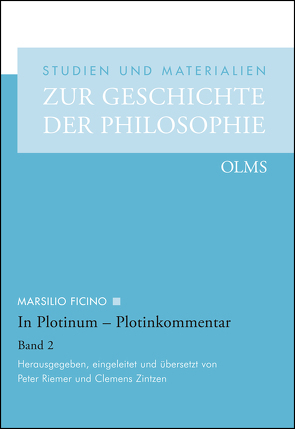
Als Sohn des Leibarztes von Cosimo de’ Medici erhielt Marsilio Ficino schon in jungen Jahren den Auftrag, Griechisch zu lernen und die Schriften Platons zu übersetzen. Auf Anregung seines Freundes Pico della Mirandola fertigte er im Anschluss daran auch eine lateinische Version vom Werk des Neuplatonikers Plotin an. Er ordnete die plotinischen Traktate in sechs Neunergruppen (Enneaden) und schrieb zu jedem der 54 ‚Bücher‘ eine kommentierende Einleitung. Mit einer Widmung an Lorenzo de’ Medici wurde Ficinos Plotinausgabe am 7. Mai 1492 in Florenz gedruckt. Seit diesem Erstdruck hat es einige weitere Editionen gegeben, zuletzt 1835 durch Friedrich Creuzer.
In der nunmehr auf drei Bände verteilten modernen Ausgabe der von Ficino selbst als Kommentar bezeichneten Einleitungen ist erstmals eine textkritische Edition mit einer deutschen Übersetzung versehen.****************The son of Cosimo de’ Medici’s personal physician, Marsilio Ficino was commissioned at a young age to learn Greek and to translate Plato’s writings. At the suggestion of his friend Pico della Mirandola, he subsequently produced a Latin version of the work of the neo-Platonist Plotinus. He arranged Plotinus’ treatises into six nine-groups (Enneaden) and wrote a commenting introduction to each of those 54 ‘books’. With a dedication to Lorenzo de’ Medici, Ficino’s Plotinus edition was printed in Florence on 7 May 1492. Since this first edition there have been published several others, most recently in 1835 by Friedrich Creuzer.
In this modern edition of the introductions, which Ficino himself described as a commentary, distributed over three volumes, a text-critical edition with a German translation is provided for the first time.
Aktualisiert: 2023-06-30
> findR *

Als Sohn des Leibarztes von Cosimo de’ Medici erhielt Marsilio Ficino schon in jungen Jahren den Auftrag, Griechisch zu lernen und die Schriften Platons zu übersetzen. Auf Anregung seines Freundes Pico della Mirandola fertigte er im Anschluss daran auch eine lateinische Version vom Werk des Neuplatonikers Plotin an. Er ordnete die plotinischen Traktate in sechs Neunergruppen (Enneaden) und schrieb zu jedem der 54 ‚Bücher‘ eine kommentierende Einleitung. Mit einer Widmung an Lorenzo de’ Medici wurde Ficinos Plotinausgabe am 7. Mai 1492 in Florenz gedruckt. Seit diesem Erstdruck hat es einige weitere Editionen gegeben, zuletzt 1835 durch Friedrich Creuzer.
In der nunmehr auf drei Bände verteilten modernen Ausgabe der von Ficino selbst als Kommentar bezeichneten Einleitungen ist erstmals eine textkritische Edition mit einer deutschen Übersetzung versehen.****************The son of Cosimo de’ Medici’s personal physician, Marsilio Ficino was commissioned at a young age to learn Greek and to translate Plato’s writings. At the suggestion of his friend Pico della Mirandola, he subsequently produced a Latin version of the work of the neo-Platonist Plotinus. He arranged Plotinus’ treatises into six nine-groups (Enneaden) and wrote a commenting introduction to each of those 54 ‘books’. With a dedication to Lorenzo de’ Medici, Ficino’s Plotinus edition was printed in Florence on 7 May 1492. Since this first edition there have been published several others, most recently in 1835 by Friedrich Creuzer.
In this modern edition of the introductions, which Ficino himself described as a commentary, distributed over three volumes, a text-critical edition with a German translation is provided for the first time.
Aktualisiert: 2023-06-30
> findR *
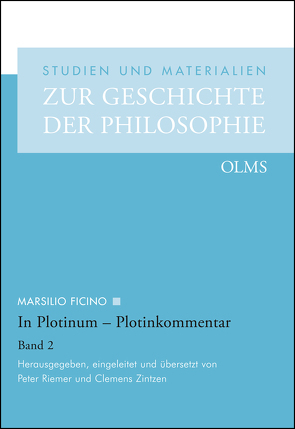
Als Sohn des Leibarztes von Cosimo de’ Medici erhielt Marsilio Ficino schon in jungen Jahren den Auftrag, Griechisch zu lernen und die Schriften Platons zu übersetzen. Auf Anregung seines Freundes Pico della Mirandola fertigte er im Anschluss daran auch eine lateinische Version vom Werk des Neuplatonikers Plotin an. Er ordnete die plotinischen Traktate in sechs Neunergruppen (Enneaden) und schrieb zu jedem der 54 ‚Bücher‘ eine kommentierende Einleitung. Mit einer Widmung an Lorenzo de’ Medici wurde Ficinos Plotinausgabe am 7. Mai 1492 in Florenz gedruckt. Seit diesem Erstdruck hat es einige weitere Editionen gegeben, zuletzt 1835 durch Friedrich Creuzer.
In der nunmehr auf drei Bände verteilten modernen Ausgabe der von Ficino selbst als Kommentar bezeichneten Einleitungen ist erstmals eine textkritische Edition mit einer deutschen Übersetzung versehen.****************The son of Cosimo de’ Medici’s personal physician, Marsilio Ficino was commissioned at a young age to learn Greek and to translate Plato’s writings. At the suggestion of his friend Pico della Mirandola, he subsequently produced a Latin version of the work of the neo-Platonist Plotinus. He arranged Plotinus’ treatises into six nine-groups (Enneaden) and wrote a commenting introduction to each of those 54 ‘books’. With a dedication to Lorenzo de’ Medici, Ficino’s Plotinus edition was printed in Florence on 7 May 1492. Since this first edition there have been published several others, most recently in 1835 by Friedrich Creuzer.
In this modern edition of the introductions, which Ficino himself described as a commentary, distributed over three volumes, a text-critical edition with a German translation is provided for the first time.
Aktualisiert: 2023-06-30
> findR *
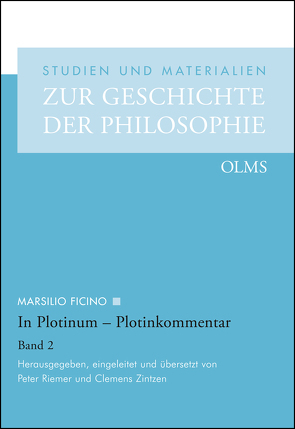
Als Sohn des Leibarztes von Cosimo de’ Medici erhielt Marsilio Ficino schon in jungen Jahren den Auftrag, Griechisch zu lernen und die Schriften Platons zu übersetzen. Auf Anregung seines Freundes Pico della Mirandola fertigte er im Anschluss daran auch eine lateinische Version vom Werk des Neuplatonikers Plotin an. Er ordnete die plotinischen Traktate in sechs Neunergruppen (Enneaden) und schrieb zu jedem der 54 ‚Bücher‘ eine kommentierende Einleitung. Mit einer Widmung an Lorenzo de’ Medici wurde Ficinos Plotinausgabe am 7. Mai 1492 in Florenz gedruckt. Seit diesem Erstdruck hat es einige weitere Editionen gegeben, zuletzt 1835 durch Friedrich Creuzer.
In der nunmehr auf drei Bände verteilten modernen Ausgabe der von Ficino selbst als Kommentar bezeichneten Einleitungen ist erstmals eine textkritische Edition mit einer deutschen Übersetzung versehen.****************The son of Cosimo de’ Medici’s personal physician, Marsilio Ficino was commissioned at a young age to learn Greek and to translate Plato’s writings. At the suggestion of his friend Pico della Mirandola, he subsequently produced a Latin version of the work of the neo-Platonist Plotinus. He arranged Plotinus’ treatises into six nine-groups (Enneaden) and wrote a commenting introduction to each of those 54 ‘books’. With a dedication to Lorenzo de’ Medici, Ficino’s Plotinus edition was printed in Florence on 7 May 1492. Since this first edition there have been published several others, most recently in 1835 by Friedrich Creuzer.
In this modern edition of the introductions, which Ficino himself described as a commentary, distributed over three volumes, a text-critical edition with a German translation is provided for the first time.
Aktualisiert: 2023-06-29
> findR *
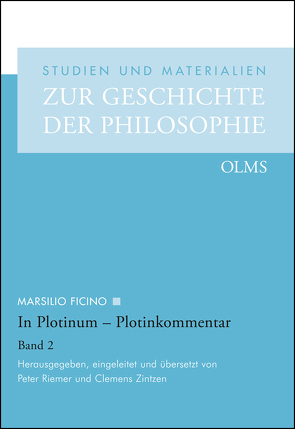
Als Sohn des Leibarztes von Cosimo de’ Medici erhielt Marsilio Ficino schon in jungen Jahren den Auftrag, Griechisch zu lernen und die Schriften Platons zu übersetzen. Auf Anregung seines Freundes Pico della Mirandola fertigte er im Anschluss daran auch eine lateinische Version vom Werk des Neuplatonikers Plotin an. Er ordnete die plotinischen Traktate in sechs Neunergruppen (Enneaden) und schrieb zu jedem der 54 ‚Bücher‘ eine kommentierende Einleitung. Mit einer Widmung an Lorenzo de’ Medici wurde Ficinos Plotinausgabe am 7. Mai 1492 in Florenz gedruckt. Seit diesem Erstdruck hat es einige weitere Editionen gegeben, zuletzt 1835 durch Friedrich Creuzer.
In der nunmehr auf drei Bände verteilten modernen Ausgabe der von Ficino selbst als Kommentar bezeichneten Einleitungen ist erstmals eine textkritische Edition mit einer deutschen Übersetzung versehen.****************The son of Cosimo de’ Medici’s personal physician, Marsilio Ficino was commissioned at a young age to learn Greek and to translate Plato’s writings. At the suggestion of his friend Pico della Mirandola, he subsequently produced a Latin version of the work of the neo-Platonist Plotinus. He arranged Plotinus’ treatises into six nine-groups (Enneaden) and wrote a commenting introduction to each of those 54 ‘books’. With a dedication to Lorenzo de’ Medici, Ficino’s Plotinus edition was printed in Florence on 7 May 1492. Since this first edition there have been published several others, most recently in 1835 by Friedrich Creuzer.
In this modern edition of the introductions, which Ficino himself described as a commentary, distributed over three volumes, a text-critical edition with a German translation is provided for the first time.
Aktualisiert: 2023-06-29
> findR *
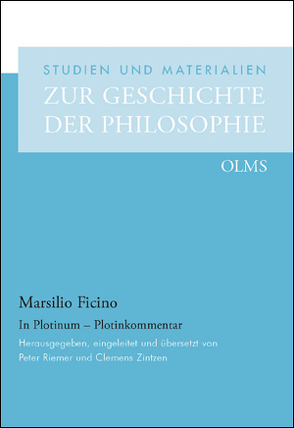
Als Sohn des Leibarztes von Cosimo de’ Medici erhielt Marsilio Ficino schon in jungen Jahren den Auftrag, Griechisch zu lernen und die Schriften Platons zu übersetzen. Auf Anregung seines Freundes Pico della Mirandola fertigte er im Anschluss daran auch eine lateinische Version vom Werk des Neuplatonikers Plotin an. Er ordnete die plotinischen Traktate in sechs Neunergruppen (Enneaden) und schrieb zu jedem der 54 ‚Bücher‘ eine kommentierende Einleitung. Mit einer Widmung an Lorenzo de’ Medici wurde Ficinos Plotinausgabe am 7. Mai 1492 in Florenz gedruckt. Seit diesem Erstdruck hat es einige weitere Editionen gegeben, zuletzt 1835 durch Friedrich Creuzer.
In der nunmehr auf drei Bände verteilten modernen Ausgabe der von Ficino selbst als Kommentar bezeichneten Einleitungen ist erstmals eine textkritische Edition mit einer deutschen Übersetzung versehen.****************The son of Cosimo de’ Medici’s personal physician, Marsilio Ficino was commissioned at a young age to learn Greek and to translate Plato’s writings. At the suggestion of his friend Pico della Mirandola, he subsequently produced a Latin version of the work of the neo-Platonist Plotinus. He arranged Plotinus’ treatises into six nine-groups (Enneaden) and wrote a commenting introduction to each of those 54 ‘books’. With a dedication to Lorenzo de’ Medici, Ficino’s Plotinus edition was printed in Florence on 7 May 1492. Since this first edition there have been published several others, most recently in 1835 by Friedrich Creuzer.
In this modern edition of the introductions, which Ficino himself described as a commentary, distributed over three volumes, a text-critical edition with a German translation is provided for the first time.
Aktualisiert: 2023-06-29
> findR *
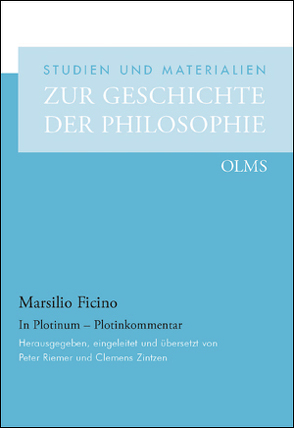
Als Sohn des Leibarztes von Cosimo de’ Medici erhielt Marsilio Ficino schon in jungen Jahren den Auftrag, Griechisch zu lernen und die Schriften Platons zu übersetzen. Auf Anregung seines Freundes Pico della Mirandola fertigte er im Anschluss daran auch eine lateinische Version vom Werk des Neuplatonikers Plotin an. Er ordnete die plotinischen Traktate in sechs Neunergruppen (Enneaden) und schrieb zu jedem der 54 ‚Bücher‘ eine kommentierende Einleitung. Mit einer Widmung an Lorenzo de’ Medici wurde Ficinos Plotinausgabe am 7. Mai 1492 in Florenz gedruckt. Seit diesem Erstdruck hat es einige weitere Editionen gegeben, zuletzt 1835 durch Friedrich Creuzer.
In der nunmehr auf drei Bände verteilten modernen Ausgabe der von Ficino selbst als Kommentar bezeichneten Einleitungen ist erstmals eine textkritische Edition mit einer deutschen Übersetzung versehen.****************The son of Cosimo de’ Medici’s personal physician, Marsilio Ficino was commissioned at a young age to learn Greek and to translate Plato’s writings. At the suggestion of his friend Pico della Mirandola, he subsequently produced a Latin version of the work of the neo-Platonist Plotinus. He arranged Plotinus’ treatises into six nine-groups (Enneaden) and wrote a commenting introduction to each of those 54 ‘books’. With a dedication to Lorenzo de’ Medici, Ficino’s Plotinus edition was printed in Florence on 7 May 1492. Since this first edition there have been published several others, most recently in 1835 by Friedrich Creuzer.
In this modern edition of the introductions, which Ficino himself described as a commentary, distributed over three volumes, a text-critical edition with a German translation is provided for the first time.
Aktualisiert: 2023-06-29
> findR *
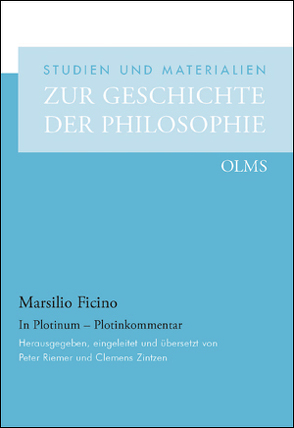
Als Sohn des Leibarztes von Cosimo de’ Medici erhielt Marsilio Ficino schon in jungen Jahren den Auftrag, Griechisch zu lernen und die Schriften Platons zu übersetzen. Auf Anregung seines Freundes Pico della Mirandola fertigte er im Anschluss daran auch eine lateinische Version vom Werk des Neuplatonikers Plotin an. Er ordnete die plotinischen Traktate in sechs Neunergruppen (Enneaden) und schrieb zu jedem der 54 ‚Bücher‘ eine kommentierende Einleitung. Mit einer Widmung an Lorenzo de’ Medici wurde Ficinos Plotinausgabe am 7. Mai 1492 in Florenz gedruckt. Seit diesem Erstdruck hat es einige weitere Editionen gegeben, zuletzt 1835 durch Friedrich Creuzer.
In der nunmehr auf drei Bände verteilten modernen Ausgabe der von Ficino selbst als Kommentar bezeichneten Einleitungen ist erstmals eine textkritische Edition mit einer deutschen Übersetzung versehen.****************The son of Cosimo de’ Medici’s personal physician, Marsilio Ficino was commissioned at a young age to learn Greek and to translate Plato’s writings. At the suggestion of his friend Pico della Mirandola, he subsequently produced a Latin version of the work of the neo-Platonist Plotinus. He arranged Plotinus’ treatises into six nine-groups (Enneaden) and wrote a commenting introduction to each of those 54 ‘books’. With a dedication to Lorenzo de’ Medici, Ficino’s Plotinus edition was printed in Florence on 7 May 1492. Since this first edition there have been published several others, most recently in 1835 by Friedrich Creuzer.
In this modern edition of the introductions, which Ficino himself described as a commentary, distributed over three volumes, a text-critical edition with a German translation is provided for the first time.
Aktualisiert: 2023-06-29
> findR *
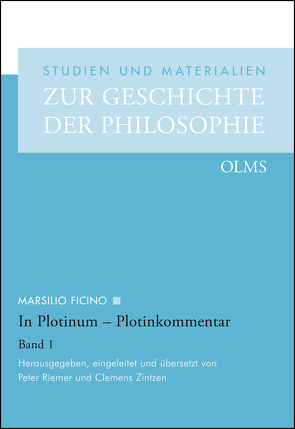
Als Sohn des Leibarztes von Cosimo de’ Medici erhielt Marsilio Ficino schon in jungen Jahren den Auftrag, Griechisch zu lernen und die Schriften Platons zu übersetzen. Auf Anregung seines Freundes Pico della Mirandola fertigte er im Anschluss daran auch eine lateinische Version vom Werk des Neuplatonikers Plotin an. Er ordnete die plotinischen Traktate in sechs Neunergruppen (Enneaden) und schrieb zu jedem der 54 ‚Bücher‘ eine kommentierende Einleitung. Mit einer Widmung an Lorenzo de’ Medici wurde Ficinos Plotinausgabe am 7. Mai 1492 in Florenz gedruckt. Seit diesem Erstdruck hat es einige weitere Editionen gegeben, zuletzt 1835 durch Friedrich Creuzer.
In der nunmehr auf drei Bände verteilten modernen Ausgabe der von Ficino selbst als Kommentar bezeichneten Einleitungen ist erstmals eine textkritische Edition mit einer deutschen Übersetzung versehen.****************The son of Cosimo de’ Medici’s personal physician, Marsilio Ficino was commissioned at a young age to learn Greek and to translate Plato’s writings. At the suggestion of his friend Pico della Mirandola, he subsequently produced a Latin version of the work of the neo-Platonist Plotinus. He arranged Plotinus’ treatises into six nine-groups (Enneaden) and wrote a commenting introduction to each of those 54 ‘books’. With a dedication to Lorenzo de’ Medici, Ficino’s Plotinus edition was printed in Florence on 7 May 1492. Since this first edition there have been published several others, most recently in 1835 by Friedrich Creuzer.
In this modern edition of the introductions, which Ficino himself described as a commentary, distributed over three volumes, a text-critical edition with a German translation is provided for the first time.
Aktualisiert: 2023-06-29
> findR *
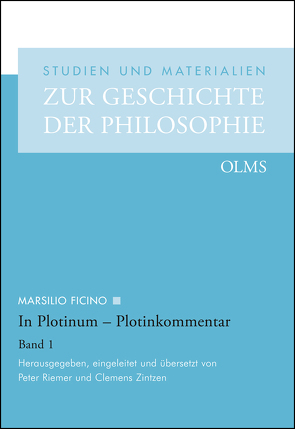
Als Sohn des Leibarztes von Cosimo de’ Medici erhielt Marsilio Ficino schon in jungen Jahren den Auftrag, Griechisch zu lernen und die Schriften Platons zu übersetzen. Auf Anregung seines Freundes Pico della Mirandola fertigte er im Anschluss daran auch eine lateinische Version vom Werk des Neuplatonikers Plotin an. Er ordnete die plotinischen Traktate in sechs Neunergruppen (Enneaden) und schrieb zu jedem der 54 ‚Bücher‘ eine kommentierende Einleitung. Mit einer Widmung an Lorenzo de’ Medici wurde Ficinos Plotinausgabe am 7. Mai 1492 in Florenz gedruckt. Seit diesem Erstdruck hat es einige weitere Editionen gegeben, zuletzt 1835 durch Friedrich Creuzer.
In der nunmehr auf drei Bände verteilten modernen Ausgabe der von Ficino selbst als Kommentar bezeichneten Einleitungen ist erstmals eine textkritische Edition mit einer deutschen Übersetzung versehen.****************The son of Cosimo de’ Medici’s personal physician, Marsilio Ficino was commissioned at a young age to learn Greek and to translate Plato’s writings. At the suggestion of his friend Pico della Mirandola, he subsequently produced a Latin version of the work of the neo-Platonist Plotinus. He arranged Plotinus’ treatises into six nine-groups (Enneaden) and wrote a commenting introduction to each of those 54 ‘books’. With a dedication to Lorenzo de’ Medici, Ficino’s Plotinus edition was printed in Florence on 7 May 1492. Since this first edition there have been published several others, most recently in 1835 by Friedrich Creuzer.
In this modern edition of the introductions, which Ficino himself described as a commentary, distributed over three volumes, a text-critical edition with a German translation is provided for the first time.
Aktualisiert: 2023-06-29
> findR *
MEHR ANZEIGEN
Bücher zum Thema textkritische Edition
Sie suchen ein Buch über textkritische Edition? Bei Buch findr finden Sie eine große Auswahl Bücher zum
Thema textkritische Edition. Entdecken Sie neue Bücher oder Klassiker für Sie selbst oder zum Verschenken. Buch findr
hat zahlreiche Bücher zum Thema textkritische Edition im Sortiment. Nehmen Sie sich Zeit zum Stöbern und finden Sie das
passende Buch für Ihr Lesevergnügen. Stöbern Sie durch unser Angebot und finden Sie aus unserer großen Auswahl das
Buch, das Ihnen zusagt. Bei Buch findr finden Sie Romane, Ratgeber, wissenschaftliche und populärwissenschaftliche
Bücher uvm. Bestellen Sie Ihr Buch zum Thema textkritische Edition einfach online und lassen Sie es sich bequem nach
Hause schicken. Wir wünschen Ihnen schöne und entspannte Lesemomente mit Ihrem Buch.
textkritische Edition - Große Auswahl Bücher bei Buch findr
Bei uns finden Sie Bücher beliebter Autoren, Neuerscheinungen, Bestseller genauso wie alte Schätze. Bücher zum
Thema textkritische Edition, die Ihre Fantasie anregen und Bücher, die Sie weiterbilden und Ihnen wissenschaftliche
Fakten vermitteln. Ganz nach Ihrem Geschmack ist das passende Buch für Sie dabei. Finden Sie eine große Auswahl
Bücher verschiedenster Genres, Verlage, Autoren bei Buchfindr:
Sie haben viele Möglichkeiten bei Buch findr die passenden Bücher für Ihr Lesevergnügen zu entdecken. Nutzen Sie
unsere Suchfunktionen, um zu stöbern und für Sie interessante Bücher in den unterschiedlichen Genres und Kategorien
zu finden. Unter textkritische Edition und weitere Themen und Kategorien finden Sie schnell und einfach eine Auflistung
thematisch passender Bücher. Probieren Sie es aus, legen Sie jetzt los! Ihrem Lesevergnügen steht nichts im Wege.
Nutzen Sie die Vorteile Ihre Bücher online zu kaufen und bekommen Sie die bestellten Bücher schnell und bequem
zugestellt. Nehmen Sie sich die Zeit, online die Bücher Ihrer Wahl anzulesen, Buchempfehlungen und Rezensionen zu
studieren, Informationen zu Autoren zu lesen. Viel Spaß beim Lesen wünscht Ihnen das Team von Buchfindr.



















